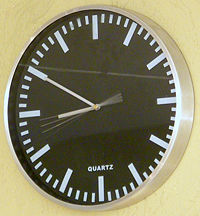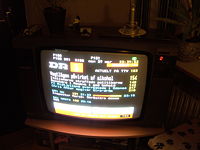Difference between revisions of "Wall clock PPM"
m (corrected spelling errors :)) |
|||
| Line 10: | Line 10: | ||
As a time reference, the clock on National Television channel DR1's [http://en.wikipedia.org/wiki/Teletext Teletext]. The accuracy of this clock is not known to me, but it is most likely sync'ed to [http://en.wikipedia.org/wiki/DCF77 DCF77] or similar. | As a time reference, the clock on National Television channel DR1's [http://en.wikipedia.org/wiki/Teletext Teletext]. The accuracy of this clock is not known to me, but it is most likely sync'ed to [http://en.wikipedia.org/wiki/DCF77 DCF77] or similar. | ||
| − | The time of sample was done by reading the clock at at certain time based on the time on the TV. The delay of up to 1 sec. still | + | The time of sample was done by reading the clock at at certain time based on the time on the TV. The delay of up to 1 sec. still exists, but I now have a "stop-watch" that can run for so long, that the 1sec is a very low factor in the overall result. |
== The point == | == The point == | ||
| − | ..is that with time, one can make quite accurate measurements of time, an accuracy not possible to do on a short time without | + | ..is that with time, one can make quite accurate measurements of time, an accuracy not possible to do on a short time without extreme equipment. if one were to prove the 57.39ppm based on the measurement of 1 seconds (optical measured perhaps with a photo-transistor), one would be able to tell if it was 1.000000000 seconds, or 1,00005739 seconds. I wish you the best of luck, a fast rise time :-) |
| − | It could also be done with a counter, counting say 1millionth parts of seconds and read out how many it takes to count one second on the clock under test, but please remember that the ref. on that counter need to be | + | It could also be done with a counter, counting say 1millionth parts of seconds and read out how many it takes to count one second on the clock under test, but please remember that the ref. on that counter need to be at least 10 times better than what you want to measure, so your counter should be at maximum 6ppm, now I ask you, why did u not put that into your clock instead? :-) |
== The results == | == The results == | ||
[[Image:PPM_Wall_clock.jpg|200px|thumb|right|Test subject - doing time-warp]] | [[Image:PPM_Wall_clock.jpg|200px|thumb|right|Test subject - doing time-warp]] | ||
[[Image:Teletext.JPG|200px|thumb|right|TeleText on the old Philips]] | [[Image:Teletext.JPG|200px|thumb|right|TeleText on the old Philips]] | ||
| − | The clock was started at 2010-03-01 12:00:02, it was set to 12:00:00, but I am slow, the 2 seconds have been | + | The clock was started at 2010-03-01 12:00:02, it was set to 12:00:00, but I am slow, the 2 seconds have been accounted for in the results below: |
2010-03-02 15:34:00 - 4 seconds ahead => 40.31ppm | 2010-03-02 15:34:00 - 4 seconds ahead => 40.31ppm | ||
Revision as of 16:53, 30 March 2010
PPM - A Layman approach to accurate measurements
The wall clock had been running too fast for a long time, about 10min, I wondered how much. Well I could use a stop-watch and count how long it takes to count 60sec. The problem with this is that the uncertainty of my reaction speed would have a significant impact on the result. Say I can react within 1 sec, that is also the resolution on the watch, the potential error is 1/60, or 16667PPM!! (OMG,BBQ,WTF and so on and so forth).
The solution was simple but brilliant (in all modesty).
As a time reference, the clock on National Television channel DR1's Teletext. The accuracy of this clock is not known to me, but it is most likely sync'ed to DCF77 or similar.
The time of sample was done by reading the clock at at certain time based on the time on the TV. The delay of up to 1 sec. still exists, but I now have a "stop-watch" that can run for so long, that the 1sec is a very low factor in the overall result.
The point
..is that with time, one can make quite accurate measurements of time, an accuracy not possible to do on a short time without extreme equipment. if one were to prove the 57.39ppm based on the measurement of 1 seconds (optical measured perhaps with a photo-transistor), one would be able to tell if it was 1.000000000 seconds, or 1,00005739 seconds. I wish you the best of luck, a fast rise time :-) It could also be done with a counter, counting say 1millionth parts of seconds and read out how many it takes to count one second on the clock under test, but please remember that the ref. on that counter need to be at least 10 times better than what you want to measure, so your counter should be at maximum 6ppm, now I ask you, why did u not put that into your clock instead? :-)
The results
The clock was started at 2010-03-01 12:00:02, it was set to 12:00:00, but I am slow, the 2 seconds have been accounted for in the results below:
2010-03-02 15:34:00 - 4 seconds ahead => 40.31ppm
2010-03-11 18:11:00 - 70 seconds ahead => 78.98ppm
2010-03-29 17:39:00 - 140 seconds ahead => 57.39ppm
Notice how the human error is minimized.
Watch was then reset according to TV channel, as DST is in effect now. New readings will be posted, once enough time has past :-)
Set time: 2010-01-29 17:42:20 a delay of 1 sec was introduced (slow mofo)
2010-01-30 17:37:00 - 5 seconds ahead => 55.75ppm
Summary
To sum it up, high ppm's sux, TeleText + time rulz. (word!) \o/ ect.
/Goofy

